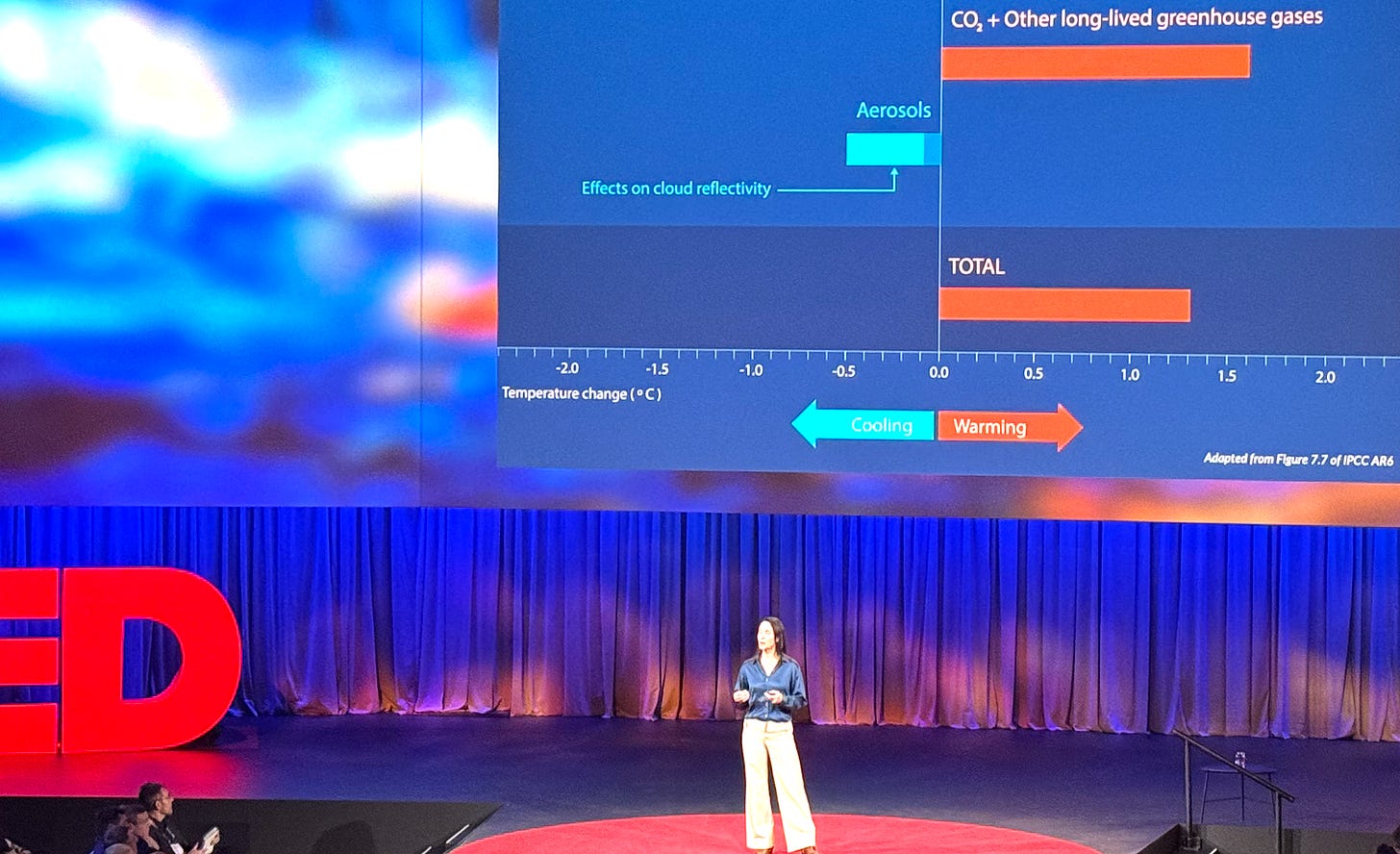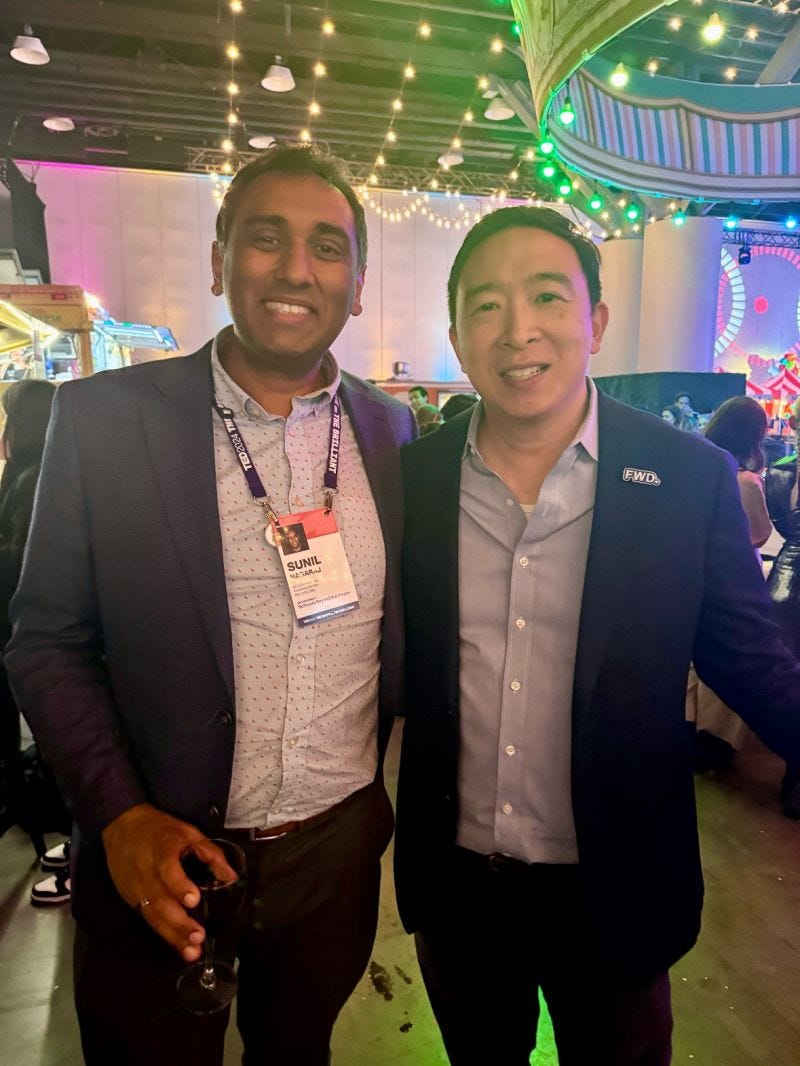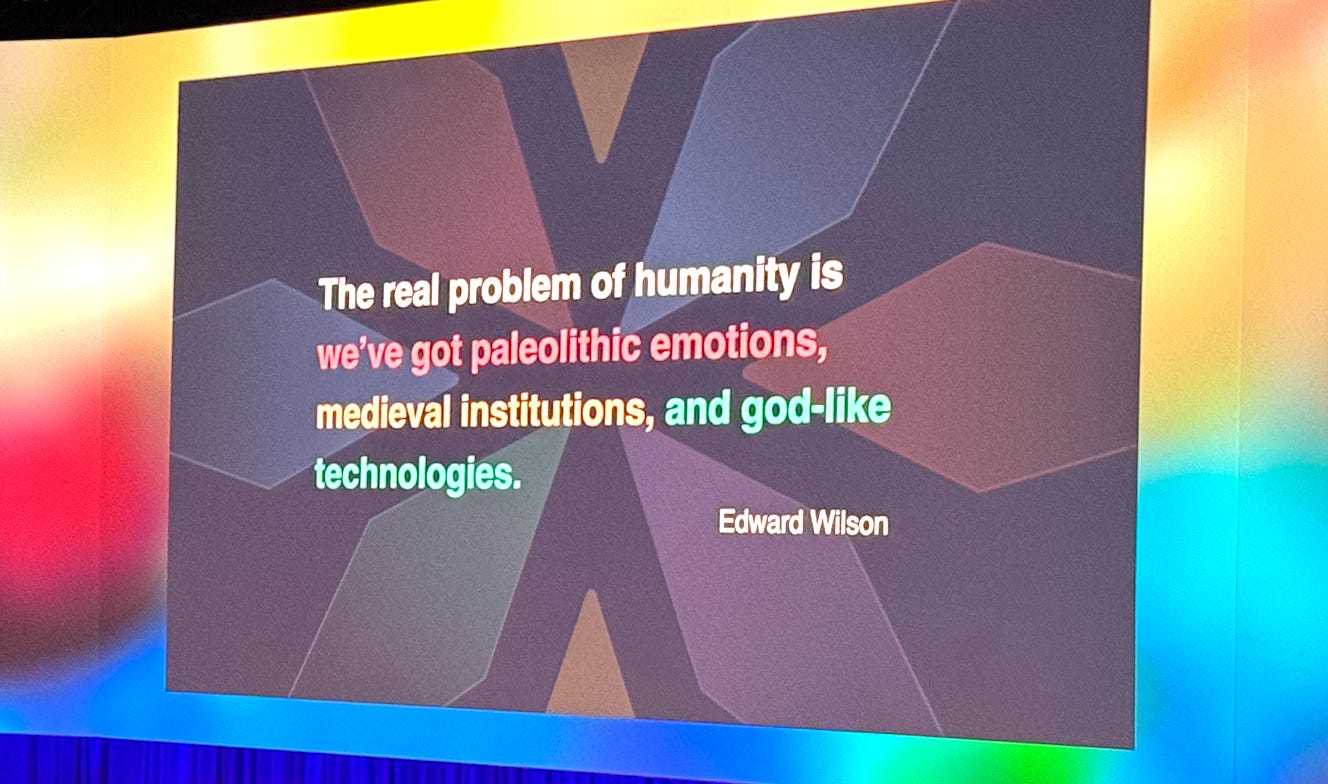My Top 10 Takeaways from TED 2024
Here are the 10 most eye-opening things I learned from 50+ TED talks in-person last week!
I just wrapped up a week at the TED Conference in Vancouver, Canada for 5 days straight of inspiring and eye-opening TED talks from leaders in a wide variety of fields. These ~15-minute talks on the main stage highlighted a person’s recent work, game-changing developments in a field, emerging problems and potential solutions, and more.
Here are my top takeaways from TED 2024:
Google DeepMind CEO Demis Hassabis on using AI to solve protein folding
Google DeepMind has used AI to compute the geometrical shape of 200 million proteins across 1 million species, covering nearly every known protein on the planet. DNA codes for amino acids that become long proteins. But how this protein chain folds into its final 3-dimensional shape is critical to the protein’s function.
Demis said it normally might take 1 PhD student their entire 6 years of study to work out the shape of 1 protein. DeepMind AlphaFold has worked out the exact shape of 200 million proteins, down to the accuracy of a width of an atom - and released this database to the world.
Demis often thinks about the “tree of knowledge” and focusing on where we can solve “root node” problems. When solved, root nodes unlock whole new sets of knowledge for humans to explore as AlphaFold does with proteins, human biology, and more.
Former Patagonia CEO Kristine Tompkins on wildlife protection and purpose
”Sentiment without action is the ruin of the soul”
”If your life’s work can be achieved in your lifetime, then you are not thinking big enough”
“You can think of rivers as ‘animal highways’ that cross human-made political borders”
VC Vinod Khosla on AI predictions
AI will soon enable several things:
Moving from the “practice” of medicine to the science of medicine including precision care based on your genomics
Expertise will soon be virtually free - free doctor, free tutor, etc.
Most internet access will actually be our AI agents doing tasks for humans, not humans surfing the internet themselves
All computer programming will be done in human language. Computers will adapt to humans, rather than humans having to adapt to computers.
New food and fertilizers will enable alternate protein production to replace animal protein
Humans will be released from the servitude of undesirable jobs
Stanford Institute of Human-Centered AI Director Fei-Fei Li
“We want AI that can do more than just see and talk. We want AI that can do.” (This rhymes with “software beyond the screen” :)
GitHub CEO Thomas Dohmke on the future of programming
We will grow from 100 million coders/GitHub users to 1 billion coders soon because AI will allow more people to code without writing code. He showed an incredible demo of GitHub Copilot Workspace.
We no longer need to speak code to unlock its power.
Former OpenAI Board Member Helen Toner on understanding AI
Both AI newbies and AI experts say the exact same thing to her: “We don’t really understand AI”.
Her strong advice: don’t be intimidated by the technology or the people (remember she was part of San Altman’s ouster at OpenAI and then was herself removed when Sam was reinstated)
Helen is Director of Strategy and Foundational Research Grants at Georgetown University’s Center for Security and Emerging Technology
Microsoft AI CEO Mustafa Suleyman on AI
A human could consume 4 billion words if they read nonstop their whole life. The latest large AI models are trained on 4 trillion words or more.
It may be helpful to think of AI as a new digital species, or as new partners in our lives.
His full TED talk video is already publicly available to watch.
Director of Marine Cloud Brightening Program Sarah Doherty on human-created global warming AND global cooling
While humans have likely already raised global average temperatures by 1.5C, this may be dramatically understating things because the aerosols (small particulate matter) that we also emit into the air actually COOLS down the Earth by making clouds more reflective to sunlight.
These emitted aerosols may be cooling the Earth by 0.5-1C, so if we stopped aerosol emissions, the temperature may actually rise as we experience the true warming impact we’ve created.
Andrew Yang on fixing broken politics with ranked choice voting instead of partisan primaries
”A problem is now worth more to us unaddressed than addressed…“ - US senator off the record :(
There is a huge incentive for political candidates to cater to the ~10% of their party’s base that actually votes during primaries. The way our partisan primary system works is that each political party votes for their own top candidate; the main election is just between the top 1 candidate from each party.
The alternative of “ranked choice voting” can MASSIVELY improve things. Every voter ranks their top 3 candidates regardless of party, and if one candidate doesn’t get >50% of first-choice votes upfront, then we eliminate the bottom candidate and add back in that candidate’s voters’ second choices. More details on how ranked-choice voting works.
Ranked choice voting has already been implemented in Maine and Alaska, where it helped Alaska Senator Lisa Murkowski (R) get re-elected even though she voted to impeach Trump (something that would have been fatal in the old partisan primary system)
Scott Galloway on “America’s War on the Young”
Over the last 35 years, 70+ year old Americans have grown from having 19% of household wealth to 30%. Under 40 year olds went from 12% down to 9% in that same period.
The median mortgage payment before the pandemic was $1,100. Now it’s $2,310
Each year, $1.4 trillion is sent to social security recipients. There needs to be a new income-based criteria to receive it in order to ensure that it will be around for future generations (“don’t take it if you don’t need it”). Yes this is in direct violation of the promise made when this generation paid into social security their whole lives.
The greatest inter generational theft ever happened during the pandemic. In 2008, the downturn presented buying opportunities for low-priced stock. In 2020, the rapid stimulus meant this window didn’t exist and precluded a generation from a low-priced stock entry point.
He ended with a single slide: “Do you love your children?” - a brilliant way to shift the discourse from earning, growing, retaining money and actually towards ensuring the stability of the next generation.
Utah Governor Spencer Cox on divided politics
“The problem isn’t how far apart we are on issues. It’s how far apart we think we are.”
This is due to “conflict entrepreneurs” who profit off a divided society, anger, etc.
Kevin Owocki on driving digital democracy via crowdfunding
Comedian and Musician Elle Cordova
Elle presented another hilarious episode of her “font humor” series. Below is a previous installment from this series. Her viral comedy sketches celebrate space, technology, literature and nerd culture.
Elle also performed her song “Carl Sagan” on stage.
Stanford Professor Brian Lowery on happiness
Relationships allow you to find happiness by being part of a story that is not your own.
The secret to happiness is to find something more important than you and devote your life to it.
Ubiquity Ventures — led by Sunil Nagaraj — is a seed-stage venture capital firm focused on startups solving real-world physical problems with "software beyond the screen", often using smart hardware or machine learning.
If your startup fits this description, fill out the 60-second Ubiquity pitch form and you’ll hear back shortly.










